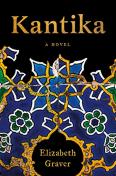
by Elizabeth Graver
Hardcover- $27.25
Click on the ORANGE Amazon Button for Book Description & Pricing Info
Overall rating:
How would you rate this book?
Member ratings
Kantika, Elizabeth Graver, author; Gail Shalan, narrator
Based loosely on the life of the author’s mother’s family, with embellishments, the book takes the reader on a journey across decades and countries as it follows the life of Rebecca Cohen. It accurately represents Jewish life and struggles, however. In the early part of the 1900’s, the very prosperous Cohen family lived in Istanbul, Turkey. As the story progresses, and as it traces the history of the Cohen family and the lives of Jews during those years, it is inspiring and enlightening in its authenticity. The trials and tribulations of the Jews is dealt with delicately and accurately. Their humiliation, lack of a homeland, rejection by the world and courage in the face of it all is outstandingly represented by this author.
Alberto and Sultana are practically forced to move to Barcelona, Spain, where he takes the job of a janitor at a quasi-synagogue. Life in Istanbul became more and more intolerable after the government confiscated ownership of the family textile business, forcing them into poverty; the family’s future alters from one that is bright to one that is very bleak. Things often went from bad to worse, before they improved somewhat. Alberto changed, as his life does, but still, they all try to deal with the adversity they are facing, bravely. Soon, they all find a center and try to recreate their Jewish lifestyle, embracing their family life.
Rebecca Cohen, an excellent dressmaker, with her own business, was a precocious and independent child. The book pretty much follows her life. At 25, still single, she finally accepted a marriage proposal without fully understanding who her husband was or how he would care for her. Luis Baruch was often absent from the home with no apparent reason, and was even absent for the birth of their children. Although sweet, Rebecca had not known that he was somewhat dimwitted.
One day, he summons her to come back to a remote area of Turkey where he says he is doing better, earning a living, and would like her to return there. Rebecca follows him back to Turkey only to discover he had died and she was now a widow. She returned to Spain to her family, picked up the pieces of her life, and worked as a seamstress while she raised her children.
Soon after, another marriage proposal was offered to her. Her childhood best friend, Rahelika, has died in childbirth leaving a husband, Samuel Levy, and a disabled child, Luna who survived. She traveled alone to Cuba to meet Samuel, leaving her children David and Alberto, behind with her parents. Their meeting was fortuitous, and after they married, they settled in America. She immediately tries to bring her children and her parents to America, as well. Europe was under the influence of Hitler and Franco, however, and the situation was grim. Spain was in turmoil for the Jews, as were other countries, and they were not allowed to leave, nor were they welcomed everywhere. Finally, she was able to bring her sons to America, but her parents were another story. It wasn’t until after her mother had died that papers approving her travel to America were approved.
Rebecca worked tirelessly to train Luna’s limbs to work better and to teach her to care for herself. She had been treated as a complete invalid, unable to have any kind of normal life, until Rebecca came into the picture. Rebecca refused to believe that she would never be independent. She unleashes her desire to help Luna and her efforts paid off. She made significant progress. Sometimes Luna resented Rebecca’s beauty because of her own lack of beauty, but as time passed, she truly improved. Rebecca and Samuel, truly in love, added more members to their family. Suzanne was born and then Frank, but after her sixth child, she had her tubes tied.
Alberto and David join the fight against Hitler. Alberto was in the states, but David was in the fog of war. At one point he is missing. Meanwhile, Luna goes to a new school with others who are bright but disabled. She awakens sexually and falls in love. She and Jean marry, and when the book ends, she proves that life goes on and hope springs eternal.
The story was inspiring as it illustrated the courage and perseverance of the Jews, and their self-discovery, even as they questioned their beliefs. It captured their authentic experiences in each of the countries and in each of their lives. The mention of Linden Boulevard and the Concord Hotel were very nostalgic for me since I knew of both places well. Although it was a poignant story, the antisemitism expressed is still alive and well. Although it is exposed, it is done so with no demand for violence, but rather with a demand for understanding and tolerance. The ancient Jewish customs come to life, as well, even after some are discarded because of the exigencies of life. The book is a wonderful read.
Book Club HQ to over 90,000+ book clubs and ready to welcome yours.
Get free weekly updates on top club picks, book giveaways, author events and more








